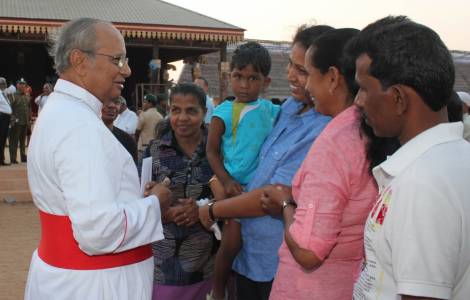
Colombo (Agenzia Fides) - "Given the serious political, social and economic problems that Sri Lanka has had to contend with in recent years, the situation has not improved. In order to keep popular discontent under control, politicians want to introduce stricter measures for social control. Criticism and protests should be banned. Leading politicians of yesterday and today and the parliament protect each other in order to maintain the status quo and maintain their own power. We face serious difficulties when it comes to... the normal exercise of democracy," said the Archbishop of Colombo, Cardinal Malcolm Ranjith, who is in the Vatican on the occasion of the ad limina visit of the Bishops of Sri Lanka to Fides.
"Together with other civil society groups, we have challenged a draft law on online security introduced in Parliament with an appeal to the Supreme Court," reports the cardinal. "This draft law is censorious and restricts freedom of expression and the fundamental rights guaranteed by the Constitution freedom of expression by intervening in particular on social media and punishing violations with prison sentences or fines. According to human rights groups, this is an attempt to “suppress criticism of the government.” Another worrying aspect reported by the Archbishop of Colombo is an "anti-terrorism law" that "confers broad powers to prosecute those suspected of subversive activities. But the vague definition of the offenses allows the law to use it completely arbitrarily and thus to get rid of political opponents or inconvenient citizens. This is a real danger to the judiciary and democracy." He also recalled that "the chapter of the victims of the 2019 Easter attacks is still open." "The Catholic Church will continue to search for the truth about the Easter Sunday attacks and demand justice for the victims. We cannot accept the version of events presented by the government and live without worries and problems," he said. He added: "However, our thoughts are not only with the Catholics, but with the entire nation. People are suffering, the social and economic crisis still has families in its grip. A third of the population only has something to eat once a day and suffers from malnutrition. The Catholic communities are doing a lot at all levels to support the poorest families. Pope Francis has already helped us twice with financial donations, Caritas Internationalis is doing the same. But these are not charitable measures to alleviate the suffering structural measures. First of all, there is the problem of politics, which must think about the common good and not only protect its own interests," the Cardinal states. The Cardinal also recalls the government's intention to "use the army to control possible protests and social unrest". "The general elections scheduled for 2024 will be crucial, the people have a great need to express themselves. However, according to some observers, Parliament could postpone the election under some pretext. But then we would risk a new major wave of popular protests, like the one in spring 2022," he emphasizes. Cardinal Malcolm Ranjith concluded that “all sections of Sri Lankan society are united” in calling for a path of transparency and democracy. "Even the Buddhist, Hindu and other religious leaders with whom we have had a fruitful dialogue and maintain good relations are united and want to preserve with us and the entire civil society the constitutional values, guarantees and civil rights. At this stage, the path appears difficult, but we will continue to do our part and faithfully support people by working for the common good and bearing witness to the truth of the Gospel", he emphasizes. (PA) (Agenzia Fides, 10/11/2023)
OCEANIA/AUSTRALIA - Appeal of 'Catholic Mission': “No” to destructive violence and hatred in society